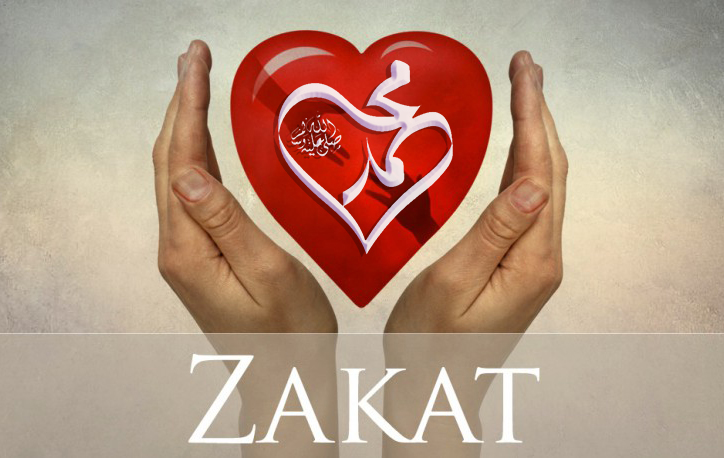
La importancia del zakah (la caridad) para la purificación espiritual – Tafsir de Surah Munafiqoon
From the Realities of Mawlana (Q) as taught by Shaykh Nurjan Mirahmadi
A’udhu Billahi Minash Shaitanir Rajeem
Bismillahir Rahmanir Raheem
Busco refugio en Allah de Satanás el desterrado
En el Nombre de Allah, el más Misericordioso, el más Compasivo
Atiullaha wa atiur Rasula wa Ulil amre minkum y antes de empezamos el khatm, inshaAllah.
﴾أَطِيعُواللَّه وَأَطِيعُوٱلرَّسُولَ وَأُوْلِي الْأَمْرِ مِنْكُمْ… ﴿٥٩…
4:59 – “…Atiullaha wa atiur Rasula wa Ulil amre minkum…” (Surat An-Nisa)
“Obedeced a Allah, obedeced al Enviado y a aquéllos de vosotros que tengan autoridad”. (Las mujeres, 4:59)
Rajab tiene la realidad de la Surah Munafiqoon (9×7=63)
 Siempre es un recuerdo para mí mismo que tenemos en este mes Surah Munafiqoon. En un mes de la luz, Subhana man huwal Khaliq anNur (Toda la gloria es para Él quien es el Creador, la Luz), en que Allah (AJ) bendice la realidad de Sayyidina Muhammad ﷺ una luz y Allah (AJ) en este séptimo mes lunar de la realidad de los sultanes, es que hay 9. Se convierte a 63, y 6 y 3 es un 9. Surah 63, Surah Munafiqoon. Entonces verso 10 de sura 63 es, inshaAllah:
Siempre es un recuerdo para mí mismo que tenemos en este mes Surah Munafiqoon. En un mes de la luz, Subhana man huwal Khaliq anNur (Toda la gloria es para Él quien es el Creador, la Luz), en que Allah (AJ) bendice la realidad de Sayyidina Muhammad ﷺ una luz y Allah (AJ) en este séptimo mes lunar de la realidad de los sultanes, es que hay 9. Se convierte a 63, y 6 y 3 es un 9. Surah 63, Surah Munafiqoon. Entonces verso 10 de sura 63 es, inshaAllah:
﴾وَأَنفِقُوا مِن مَّا رَزَقْنَاكُم مِّن قَبْلِ أَن يَأْتِيَ أَحَدَكُمُ الْمَوْتُ فَيَقُولَ رَبِّ لَوْلَا أَخَّرْتَنِي إِلَىٰ أَجَلٍ قَرِيبٍ فَأَصَّدَّقَ وَأَكُن مِّنَ الصَّالِحِينَ ﴿١٠
63:10 – “Wa anifqoo mim maa razaqnaakum min qabli any-ya’tiya ahadakumul mawtu fa yaqoola rabbi law laaa akhkhartaneee ilaaa ajalin qareebin fa assaddaqa wa akum minassaaliheen” (Surat Al-Munafiqoon)
Gastad de lo que os hemos proveído (en la caridad), antes de que la muerte venga a uno de vosotros y éste diga: Señor! Por qué no me das algo más de tiempo, para que dé limosna y sea de los justos. (Los hípocritas, 63:10)
Todo el mundo va a sufrir la muerte
Todo lo que vemos en este mundo y todas las du’as (las suplicaciones) e istegfars y awliyaullah (los santos) vienen a nuestras vidas y nos enseñan del Sagrado Corán, atiullaha wa atiur Rasula wa Ulil amre minkum.
﴾أَطِيعُواللَّه وَأَطِيعُوٱلرَّسُولَ وَأُوْلِي الْأَمْرِ مِنْكُمْ… ﴿٥٩…
4:59 – “…Atiullaha wa atiur Rasula wa Ulil amre minkum…” (Surat An-Nisa)
“Obedeced a Allah, obedeced al Enviado y a aquéllos de vosotros que tengan autoridad”. (Las mujeres, 4:59)
 Ana abdukal ‘ajiz, wa dayif, wa miskin, wa zhalem, wa jahl, y por la Gracia de Allah (AJ) que Él nos ha mantenido vivos hasta ahora. Allah (AJ) advierte la humanidad, ‘Todo el mundo va a experimentar la muerte.’ No se puede escapar la muerte. Todo el pánico y la prisa y al final todo el mundo probará la muerte. La televisión pondrá el temor en los corazones de la gente, pero un creyente tiene el temor dentro de sus corazones que claro, voy a morir. ¿Voy a morir por una gripe, por un coche, por un accidente, por caerse, por morir de viejo? Sea lo que sea, Allah (AJ) recuerda a los que creer, “Todos probarán la muerte”.
Ana abdukal ‘ajiz, wa dayif, wa miskin, wa zhalem, wa jahl, y por la Gracia de Allah (AJ) que Él nos ha mantenido vivos hasta ahora. Allah (AJ) advierte la humanidad, ‘Todo el mundo va a experimentar la muerte.’ No se puede escapar la muerte. Todo el pánico y la prisa y al final todo el mundo probará la muerte. La televisión pondrá el temor en los corazones de la gente, pero un creyente tiene el temor dentro de sus corazones que claro, voy a morir. ¿Voy a morir por una gripe, por un coche, por un accidente, por caerse, por morir de viejo? Sea lo que sea, Allah (AJ) recuerda a los que creer, “Todos probarán la muerte”.
﴾كُلُّ نَفْسٍ ذَائِقَةُ الْمَوْتِ ۗ وَنَبْلُوكُم بِالشَّرِّ وَالْخَيْرِ فِتْنَةً ۖ وَإِلَيْنَا تُرْجَعُونَ ﴿٣٥
21:35 – “Kullu nafsin dhayiqatul Mawti, wa nablokum bish sharri wal khayri fitnatan, wa ilayna turja’oon.” (Surat Al-Anbiya)
Cada uno gustará la muerte. Os probamos tentándoos con el mal y con el bien. Y a Nosotros seréis devueltos. (Los profetas, 21:35)
Da todo lo que puedes durante el tiempo que Allah (AJ) ha dado
 Y la Rahma infinita de Allah (AJ) cuando Él manda algo como esta dificultad para que la muerte no te tome por sorpresa. Porque si lo tomaría por sorpresa y Allah (AJ) da un ayatul kareem de Sura al-Munafiqoon cuánto vas a tener el remordimiento. El nos da tiempo. Él le muestra a toda de Su creación que Él ama y Él creó esta creación con amor. No voy a destruirlo en golpe, pero con una grita y Allah (AJ) diezma toda una población en las naciones de antes.
Y la Rahma infinita de Allah (AJ) cuando Él manda algo como esta dificultad para que la muerte no te tome por sorpresa. Porque si lo tomaría por sorpresa y Allah (AJ) da un ayatul kareem de Sura al-Munafiqoon cuánto vas a tener el remordimiento. El nos da tiempo. Él le muestra a toda de Su creación que Él ama y Él creó esta creación con amor. No voy a destruirlo en golpe, pero con una grita y Allah (AJ) diezma toda una población en las naciones de antes.
﴾إِن كَانَتْ إِلَّا صَيْحَةً وَاحِدَةً فَإِذَا هُمْ خَامِدُونَ ﴿٢٩
36:29 – “In kanat illa sayhatan wahidatan fa idha hum khamidoon.” (Surat YaSeen)
No hubo más que un solo Grito y ¡helos sin vida! (YaSeen, 36:29)
Pero todo esto está bajo la intercesión de Sayyidina Muhammad ﷺ. Hay una nación que aceptó el dawa y una nación que aún no ha aceptado el dawa. Todo está bajo de la intercesión de Sayyidina Muhammad ﷺ. Por eso, Allah (AJ) no destruyó la creación. Él les da tiempo y nos da tiempo. ¿Ves como todo se desmorona? Haga tu hisab, lleva tu cuenta. Hazte bien con Allah (AJ) y es un recordatorio para mí mismo, ¿estoy bien con Allah (AJ)?
Los Salihin dan todo en el camino de Allah (AJ)
 Y en este mes este evento ocurre y Allah (AJ) describe en ayatul Karim lo que el creyente sufrirá en su estado de muerte y dice, “‘Bismillahir Rahmanir Raheem. Y da en la caridad del sustento que Nosotros te otorgamos, antes que tu vendrías a nosotros, antes que vendrías a la Presencia Divina y el creyente gritará a su Señor. Ya Rabbi, ¡Dios mio! Por qué no me dio tiempo y una respire? (Sagrado Coran, 63:10)
Y en este mes este evento ocurre y Allah (AJ) describe en ayatul Karim lo que el creyente sufrirá en su estado de muerte y dice, “‘Bismillahir Rahmanir Raheem. Y da en la caridad del sustento que Nosotros te otorgamos, antes que tu vendrías a nosotros, antes que vendrías a la Presencia Divina y el creyente gritará a su Señor. Ya Rabbi, ¡Dios mio! Por qué no me dio tiempo y una respire? (Sagrado Coran, 63:10)
Significa ¿por qué me tomas de repente y no me diste ningún tiempo? Y lo que pregunta él no es para el tiempo para su rezar, no para el tiempo para su hajj (la peregrinación), no para el tiempo para su ayunar, pero “Ya Rabbi, por qué no me dio el tiempo en el que yo pudiera haber dado mucho en la caridad y que pudiera haber sido de los salihin?” Y Allah (AJ) nos enseña que esta estación de salihin (honrados), ellos dieron todo en el camino de Allah (AJ).
﴾وَأَنفِقُوا مِن مَّا رَزَقْنَاكُم مِّن قَبْلِ أَن يَأْتِيَ أَحَدَكُمُ الْمَوْتُ فَيَقُولَ رَبِّ لَوْلَا أَخَّرْتَنِي إِلَىٰ أَجَلٍ قَرِيبٍ فَأَصَّدَّقَ وَأَكُن مِّنَ الصَّالِحِينَ ﴿١٠
63:10 – “Wa anifqoo mim maa razaqnaakum min qabli any-ya’tiya ahadakumul mawtu fa yaqoola rabbi law laaa akhkhartaneee ilaaa ajalin qareebin fa assaddaqa wa akum minassaaliheen” (Surat Al-Munafiqoon)
Gastad de lo que os hemos proveído (en la caridad), antes de que la muerte venga a uno de vosotros y éste diga: Señor! Por qué no me das algo más de tiempo, para que dé limosna y sea de los justos. (Los hípocritas, 63:10)
Acumulamos las enfermedades cuando atesoramos la riqueza material
 Cuando Allah (AJ) muestra que con cada tipo de dificultad, estás más preocupado por tu cuenta y tus cuentas de bancos y las acciones de la bolsa de valores y no estamos preocupados por nuestra hisab (cuenta) con Allah (AJ). Y el zakah (la caridad) y zaki, estar purificado, la sadaqa (la caridad) para sacar la enfermedad y la dificultad significa para el insan (el ser humano) cualquier cosa ellos ganan y acumulan, construyen un peso en sus mismos, como recoger los viruses y los gérmenes y sus cuerpos se enconan con todos los tipos de infecciones.
Cuando Allah (AJ) muestra que con cada tipo de dificultad, estás más preocupado por tu cuenta y tus cuentas de bancos y las acciones de la bolsa de valores y no estamos preocupados por nuestra hisab (cuenta) con Allah (AJ). Y el zakah (la caridad) y zaki, estar purificado, la sadaqa (la caridad) para sacar la enfermedad y la dificultad significa para el insan (el ser humano) cualquier cosa ellos ganan y acumulan, construyen un peso en sus mismos, como recoger los viruses y los gérmenes y sus cuerpos se enconan con todos los tipos de infecciones.
 Cuando venga la dificultad, el resultado de todo el inflamar es lo que les hacen enfermos. Pensamos que, ‘Oh, queremos echar la culpa a alguien. Queremos echar la culpa a Allah (AJ) para hacer esto’ Él dijo, “ No, no. No estás zaki, no estás limpio. Todo lo que ganas y haces en tu vida, te lo acumulas e inflamas toda esta enfermedad.” Estás acumulándote el dinero y los fondos. Y aún así no te purificas el alma y lo que has acumulado se conviertió una infección en ti. Te quita tu fe, te quita tu corazón y pone el corazón en la oscura. Cada tipo de enfermedad empieza a acumular en este insan. Y Él implora a Allah (AJ), “¿Por qué me llevaste como así? Déjame a volver. Déjame volver y vaciaré mis cuentas para que yo pueda ser de los salihin (los rectos) (El Sagrado Corán, 63:10).”
Cuando venga la dificultad, el resultado de todo el inflamar es lo que les hacen enfermos. Pensamos que, ‘Oh, queremos echar la culpa a alguien. Queremos echar la culpa a Allah (AJ) para hacer esto’ Él dijo, “ No, no. No estás zaki, no estás limpio. Todo lo que ganas y haces en tu vida, te lo acumulas e inflamas toda esta enfermedad.” Estás acumulándote el dinero y los fondos. Y aún así no te purificas el alma y lo que has acumulado se conviertió una infección en ti. Te quita tu fe, te quita tu corazón y pone el corazón en la oscura. Cada tipo de enfermedad empieza a acumular en este insan. Y Él implora a Allah (AJ), “¿Por qué me llevaste como así? Déjame a volver. Déjame volver y vaciaré mis cuentas para que yo pueda ser de los salihin (los rectos) (El Sagrado Corán, 63:10).”
¡Tu dinero no va a salvarte el alma!
 Y eso es el aviso que nos dan los awliyaullah (los santos), que haga tu trato con Allah (AJ). Dejate tu dunya (mundo material) para tu akirah (el más allá). Este dunya se desmorona ¿Por qué tratas de corres tras el dunya, acumulas el dunya? Todo el dinero del mundo no va a salvarte de lo que viene ahora y si sufres el muerte, ¿estás preparado para conocerte Allah (AJ)? Cuando Él te pregunta ¿para qué es todo lo que tienes en tu cuenta acumulaste en tu cuenta? ¿Donaste en el camino de Allah (AJ) para purificarte la propia alma? No debe ser que lo donaste y entonces juzgas a quién debes darlo o si lo merezcan. ¡Eso no es asunto tuyo! Tu asunto era purificarte el alma por donar. Cuando tú diste, purificaste y te lavaste. Tú te quitas toda la bacteria de ti mismo.
Y eso es el aviso que nos dan los awliyaullah (los santos), que haga tu trato con Allah (AJ). Dejate tu dunya (mundo material) para tu akirah (el más allá). Este dunya se desmorona ¿Por qué tratas de corres tras el dunya, acumulas el dunya? Todo el dinero del mundo no va a salvarte de lo que viene ahora y si sufres el muerte, ¿estás preparado para conocerte Allah (AJ)? Cuando Él te pregunta ¿para qué es todo lo que tienes en tu cuenta acumulaste en tu cuenta? ¿Donaste en el camino de Allah (AJ) para purificarte la propia alma? No debe ser que lo donaste y entonces juzgas a quién debes darlo o si lo merezcan. ¡Eso no es asunto tuyo! Tu asunto era purificarte el alma por donar. Cuando tú diste, purificaste y te lavaste. Tú te quitas toda la bacteria de ti mismo.
El zakah (la caridad) tiene muchos niveles
 Entonces vienen a nuestras vidas y nos enseñan el zakah (la caridad) tiene muchos niveles. El Zakah de Shari’a (el Ley Divino) es el 2,5% y con la contabilidad astuta ellos pagan $5 al final y se van. [Dicen], porque esto es no, esto es no va, dos camellos, no es un camello, esto es más. El zakah (la caridad) es el mínimo, es el 2,5% pero la tariqa (el camino espiritual) llega y dice, no, min kulli ma yu khalifu shari’ah, tariqah, ma’rifah, haqiqah, azimah. Hay grados en los que van a escalar. Donaste el mínimo para la Shari’a (el Ley Divino) y tu mano tembló y apenas tú te limpias.
Entonces vienen a nuestras vidas y nos enseñan el zakah (la caridad) tiene muchos niveles. El Zakah de Shari’a (el Ley Divino) es el 2,5% y con la contabilidad astuta ellos pagan $5 al final y se van. [Dicen], porque esto es no, esto es no va, dos camellos, no es un camello, esto es más. El zakah (la caridad) es el mínimo, es el 2,5% pero la tariqa (el camino espiritual) llega y dice, no, min kulli ma yu khalifu shari’ah, tariqah, ma’rifah, haqiqah, azimah. Hay grados en los que van a escalar. Donaste el mínimo para la Shari’a (el Ley Divino) y tu mano tembló y apenas tú te limpias.
Tenemos que dar para purificarnos
 La tariqa inmediatamente, Allah (AJ) “Khudh min amwalihim” – que es la qibla en esa pared, “toma su sustento” En sura Taueba, que es el primero bab (la puerta) de este camino. Verso 103, Sura Taueba, “Khudh min amwaalihim”.
La tariqa inmediatamente, Allah (AJ) “Khudh min amwalihim” – que es la qibla en esa pared, “toma su sustento” En sura Taueba, que es el primero bab (la puerta) de este camino. Verso 103, Sura Taueba, “Khudh min amwaalihim”.
﴾خُذْ مِنْ أَمْوَالِهِمْ صَدَقَةً تُطَهِّرُهُمْ وَتُزَكِّيهِم بِهَا وَصَلِّ عَلَيْهِمْ ۖ إِنَّ صَلَاتَكَ سَكَنٌ لَّهُمْ ۗ وَاللَّـهُ سَمِيعٌ عَلِيمٌ ﴿١٠٣
9:103 – “Khudh min amwalihim sadaqatan tutahhiruhum wa tuzakkeehim biha wa salli ‘alayhim, inna salawataka sakanun lahum, wallahu samee’un ‘aleem. (Surat At-Tawbah)
¡Deduce [O Muhammad (la paz sea con él)] de sus bienes una limosna para limpiarles y purificarles con ella! ¡Y ora por ellos! Tu oración les sosiega. Allah todo lo oye, todo lo sabe.” (El arrepentimiento 9:103)
Toma su dinero. No van a dártelo. Toma y reza por ellos porque les hace enfermos. Allah (AJ) te preguntará sobre lo que guardas en tu cuenta, lo traerá cada enfermedad en ti y tu familia. Toman y hacen los círculos de paraíso y hacen jardines de paraíso. Este [Centro] no estaba aquí antes. Un Shaykh vino a la ciudad y forzó a todo el mundo donar y por el resultado tienen un círculo de paraíso. Y dondequiera que vayan ellos tratan de hacer un círculo de paraíso. Es un círculo de nachat (la salvación) y la seguridad. Y ese círculo de paraíso eternamente da a tu alma – no te castiga el alma, te bendice el alma.
El zakah de tariqa – la mayor jihad está contra nuestros mismos deseos
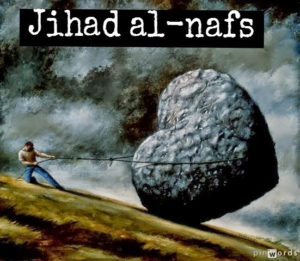 Ellos vienen a nuestras vidas para perfeccionar nuestra fe y nuestra realidad. El zakah de tariqa. El shaykh inspira que – dona, toma la manera de tariqa, el camino de jihad al-Akbar. En la jihad, en el tiempo de Sayyidina Muhammad ﷺ, había un khums de 20% (el impuesto de bienes de 1/5) en todo. Cualquier cosa que se obtuviera en el campo, del botín a los tesoros, el 20% se daban al Profeta ﷺ, el Rasul de Allah (AJ). Khums era algo que se para. Pero el turuq (los caminos espirituales), no, eso completamente permanece a esa realidad. No aceptan 2,5% de nadie. Son una gente que todavía están en la puerta y solo miran para entrar. Cuando Allah (AJ) inspira, hace su jihad (la lucha) real lo que describe el Profeta ﷺ es, “Su mayor jihad está contra sus mismos”.
Ellos vienen a nuestras vidas para perfeccionar nuestra fe y nuestra realidad. El zakah de tariqa. El shaykh inspira que – dona, toma la manera de tariqa, el camino de jihad al-Akbar. En la jihad, en el tiempo de Sayyidina Muhammad ﷺ, había un khums de 20% (el impuesto de bienes de 1/5) en todo. Cualquier cosa que se obtuviera en el campo, del botín a los tesoros, el 20% se daban al Profeta ﷺ, el Rasul de Allah (AJ). Khums era algo que se para. Pero el turuq (los caminos espirituales), no, eso completamente permanece a esa realidad. No aceptan 2,5% de nadie. Son una gente que todavía están en la puerta y solo miran para entrar. Cuando Allah (AJ) inspira, hace su jihad (la lucha) real lo que describe el Profeta ﷺ es, “Su mayor jihad está contra sus mismos”.
عَنْ جَابِرُ قَالَ قَدِمَ عَلَى رَسُولُ اللَّهِ (صَلَّى اللَّهُ عَلَيْهِ وَسَلَّمَ) قَوْمٌ غَزَاةٌ، فقَالَ النَّبِيُّ صَلَّى اللَّهُ عَلَيْهِ وَسَلَّمَ: ” قَدِمْتُمْ خَيْرَ مَقْدَمٍ مِنْ الْجِهَادِ الْأَصْغَرْ إِلَى الْجِهَادِ الْأكْبَرْ.” قِيْلَ وَمَا اَلْجِهَادِ الْأكْبَرْ؟ قَالَ: ” مُجَاهَدَةُ الْعَبْدِ هَوَاهُ
“An Jabiru qala, ‘qadema ‘ala Rasulullahiﷺ qawmun ghazatun, faqalan Nabiyu Sallallahu Alayhi was Salaam: ” Qademtum khaira maqdamin min jihadil Asghar ilal Jihadil Akbar.” Qeela “wa ma al Jihadil Akbar?” Qala “Mujahidatul ‘Abdi hawahu.”
Chabir (as) narró: “Algunos Guerreros vinieron al Profeta Sagrado ﷺ (la paz sea con él). Él (Muhammad la pas sea con él) les dijo, ‘Bienvenido de Vuelta, ustedes volvieron de una jihad/lucha menor a la mayor Lucha”
Se preguntaron, “¿Qué es la lucha más grande, O Profeta de Allah? El Profeta (la paz sea con él) contestó, “Es la lucha del creyente contra sus mismos Yo/los deseos mundanos.” (Bayhaqi Kitab ul Zuhd-al-Kabir)
 La mayor lucha hoy es separar el insan (el ser humano) de su dinero porque le rinde culto a su dinero. Chequean sus cuentas cada día para ver cuánto tiene. Los shayks y sus caridades tienen cuentas porque nunca saben que tienen que gastar. Gastan $10.000 en esto, tienen $70.000 en comida y ahora la gente que nunca hemos visto antes, vienen aquí para comprar el papel de baño porque no hay nada disponible en ninguna parte. Y nunca regresaron después de todo lo que compraron aquí, y hoy vienen para el papel de baño. Ellos saben en su alma de lo que se burlaron. Mawlana Shaykh Nazim (Q) dijo que un día vendrá – cuando el artículo más caro y precioso es la comida. Comida. La gente buscará en las tumbas para desenterrar a los muertos para comer porque no hay comida en la Tierra.
La mayor lucha hoy es separar el insan (el ser humano) de su dinero porque le rinde culto a su dinero. Chequean sus cuentas cada día para ver cuánto tiene. Los shayks y sus caridades tienen cuentas porque nunca saben que tienen que gastar. Gastan $10.000 en esto, tienen $70.000 en comida y ahora la gente que nunca hemos visto antes, vienen aquí para comprar el papel de baño porque no hay nada disponible en ninguna parte. Y nunca regresaron después de todo lo que compraron aquí, y hoy vienen para el papel de baño. Ellos saben en su alma de lo que se burlaron. Mawlana Shaykh Nazim (Q) dijo que un día vendrá – cuando el artículo más caro y precioso es la comida. Comida. La gente buscará en las tumbas para desenterrar a los muertos para comer porque no hay comida en la Tierra.
Apoya los awliyaullah y tu alma será premiada
 Significa que no es algo trivial. Los awliyaullah (los santos), planean 10, 15, 20 años de antemano y todo el mundo se burla, burla, burla. No se importa, como el barco de Nuh (as). Pero cuando no tengan nada de comer y están golpeando la puerta, ‘déjame entrar’. Digo, ‘Pero ¿no era tú quien estaba quejando que esto fue $5 caro más que Costco? Ahora vete y haga cola en Costco por favor.” ¿No te ves la cola pasa todo el camino hasta alrededor de la cuadra 3 veces? No hay ninguna cola aquí. Esa es la tariqa (el camino espiritual). Zakah de la tariqa, el shaykh te inspira dar de lo que Allah (AJ) te dio para que puedan hacer su dawa. Propaga su mensaje, estará bendito de todo lo que la gente lea en el Internet, en un libro, en las redes sociales.
Significa que no es algo trivial. Los awliyaullah (los santos), planean 10, 15, 20 años de antemano y todo el mundo se burla, burla, burla. No se importa, como el barco de Nuh (as). Pero cuando no tengan nada de comer y están golpeando la puerta, ‘déjame entrar’. Digo, ‘Pero ¿no era tú quien estaba quejando que esto fue $5 caro más que Costco? Ahora vete y haga cola en Costco por favor.” ¿No te ves la cola pasa todo el camino hasta alrededor de la cuadra 3 veces? No hay ninguna cola aquí. Esa es la tariqa (el camino espiritual). Zakah de la tariqa, el shaykh te inspira dar de lo que Allah (AJ) te dio para que puedan hacer su dawa. Propaga su mensaje, estará bendito de todo lo que la gente lea en el Internet, en un libro, en las redes sociales.
Todo, la Haqqiqatul Muhammadiya (la realidad Muhammadan) es de los niveles más altas de la realidad. No los todos los tafsires y los videos diferentes de wudu (la ablución). Estos son de las realidades del Sultanato de Sayyidina Muhammad ﷺ. La sola palabra y sola letra que leen, ¿qué premio bendecirá Allah (AJ) en el alma de él el que lo lea? Imagina él quien lo propaga y apoya, los patrocinadores de esa realidad. Si no tengan lengua para contarlo, por lo menos ponen su dinero y patrocinarlo para propagar el mensaje que va a todas partes. Porque aun ahora vemos esto y es el tiempo Mahdiyun. Todo se desploma, ‘pum pum pum’
Sé inspirado vivir una vida de Khidmat
 Zakah de la tariqa, zakat al-shari’ah, zakat al-tariqah, zakat al-ma’rifah. Ma’rifah (el gnosticismo) significa Allah (AJ) quiere que sean la gente que presencian y empiezan a sacrificar todo en su vida. No solo dan de su propiedad, hacen más que esto. El shaykh empieza a inspirarte a dar ti mismo, pon tu cabeza en la mesa. Empiezas a vivir una vida de khidmat (servicio). Por eso el shaykh inspira la gente, ‘Vamos. Vamos y hacemos nuestra dawa . Ven y sé de servicio aquí porque esto es el zakah de ma’rifah.
Zakah de la tariqa, zakat al-shari’ah, zakat al-tariqah, zakat al-ma’rifah. Ma’rifah (el gnosticismo) significa Allah (AJ) quiere que sean la gente que presencian y empiezan a sacrificar todo en su vida. No solo dan de su propiedad, hacen más que esto. El shaykh empieza a inspirarte a dar ti mismo, pon tu cabeza en la mesa. Empiezas a vivir una vida de khidmat (servicio). Por eso el shaykh inspira la gente, ‘Vamos. Vamos y hacemos nuestra dawa . Ven y sé de servicio aquí porque esto es el zakah de ma’rifah.
Como van a alcanzar para presenciar una realidad cuando no quieren pasar ningún tiempo, solo quieren ver todo? No, ya vinieron por la Puerta, dieron su mínimo. Entonces vinieron a un nivel más alto en que dan mucho de lo que Allah (AJ) les ha proveído. Ahora están en la Puerta de ma’rifah (el gnosticismo) y Allah (AJ) les inspira otra vez dentro de sí mismos – da ti mismo. Porque Él dice, ¿cómo vas a lograr esta estación cuando no has logrado lo que otros lograron de antes de ti? Dieron su vida, su familia, su riqueza, y todas sus posesiones. Vas a ser puesto a prueba como los quienes vinieron antes que tú. ¿Cómo vas a lograr estas estaciones de iman (la fe) cuando les pusieron a prueba tan duramente? [Pero dicen] No voy a tomar ninguna prueba. Quiero alcanzar los niveles más altos de iman (la fe), entonces Allah (AJ) dijo, “No, llámanlos”.
Ser de servicio consolida tu cuenta con Allah (AJ)
 Por eso decimos en estas tariqas (los caminos espirituales) tienen un currículo. Saben el movimiento en lo que quiere el Profeta ﷺ la gente. Cualquiera burlas la gente quiere dar, no les importan. Con cualquier temblor que dan, no les importa. Tome de ellos. Entonces les convencen de ser de servicio. Escribe. Haz post. Haz la dawa . Cocina. Haz algo para mostrar el khidmat (el servicio). Este khidmat en el camino de Allah (AJ) y Sayyidina Muhammad ﷺ abre una rahma (la bendición) inmensa.
Por eso decimos en estas tariqas (los caminos espirituales) tienen un currículo. Saben el movimiento en lo que quiere el Profeta ﷺ la gente. Cualquiera burlas la gente quiere dar, no les importan. Con cualquier temblor que dan, no les importa. Tome de ellos. Entonces les convencen de ser de servicio. Escribe. Haz post. Haz la dawa . Cocina. Haz algo para mostrar el khidmat (el servicio). Este khidmat en el camino de Allah (AJ) y Sayyidina Muhammad ﷺ abre una rahma (la bendición) inmensa.
Cuando rezas, reza, “Ya Rabbi, por favor perdóname la vida, quítame esta enfermedad, quítame esta enfermedad, saca esta enfermedad.” Dice, “¿Por qué?” Has pensado alguna vez que hay una voz en la otra parte que dice, “¿Por qué?” Tú, en realidad, no sirves para nada en esta Tierra, sal de aquí. Puedes ir. Pero una vida de khidmat, Allah (AJ) dice, “No hay ninguna razón para tomarte ahora mismo. Haces buen trabajo, un intento genial. Propagas su mensaje y la imagen de Mi más querido.”
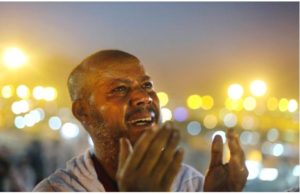 Entonces, esto significa que nuestro hisab tiene algo. Si sirvo un uso para ti, Ya Rabbi, mantenme vivir. Si no sirvo para nada para ti, estoy mejor muerte. No quería estar aquí de todos modos. No sé cómo me trajiste en esta estación y a esta dunya (mundo material), “Agar bihoodeh migooyam mara khamoosh kon.” Que recitamos “Ya Rab”. Si digo una mentira, Ya Rabbi, extingueme.
Entonces, esto significa que nuestro hisab tiene algo. Si sirvo un uso para ti, Ya Rabbi, mantenme vivir. Si no sirvo para nada para ti, estoy mejor muerte. No quería estar aquí de todos modos. No sé cómo me trajiste en esta estación y a esta dunya (mundo material), “Agar bihoodeh migooyam mara khamoosh kon.” Que recitamos “Ya Rab”. Si digo una mentira, Ya Rabbi, extingueme.
به حرفم، گوش کن یا رب به دردم، گوش کن یا رب
اگر بیهوده میگویم مرا خاموش کن یارب
Be harfam goosh kon, ya Rab Be dardam goosh kon, ya Rab
Agar bihoodeh migooyam Maraa khamoosh, kon ya Rab
O mi Dios, por favor escuchame mi súplica. Escucha mi doler y pena. Y si digo las tonterías a Ti, extíngueme y hazme inexistente.
Los awliya nos dan un mayor propósito en la vida
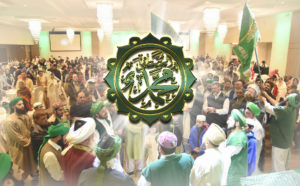 Si tengo un uso para ti, dame la meta hacer. Si no tengo ninguna meta, estoy mejor muerto. Porque cada día que pasa sin objetivo para mí, me alejo de la fe. Hago como si estuviera en el tiempo libre y las vacaciones. Por eso, significa que nuestro khidmat (el servicio) en nuestro camino nos da un uso.
Si tengo un uso para ti, dame la meta hacer. Si no tengo ninguna meta, estoy mejor muerto. Porque cada día que pasa sin objetivo para mí, me alejo de la fe. Hago como si estuviera en el tiempo libre y las vacaciones. Por eso, significa que nuestro khidmat (el servicio) en nuestro camino nos da un uso.
Entonces, como una comunidad el shaykh da a todos un objetivo. Nuestro objetivo es nuestra dawa (la propagación religiosa). Nuestros libros, nuestro Internet, nuestras redes sociales y ahora nuestro gran Mawlid. Seis años, mashAllah, consecutivos nos da un objetivo. Vamos a hacer un gran y hermoso Milad un Nabi ﷺ (la celebración del Nacimiento del Profeta ﷺ). Eso es el zakat de ma’rifah (el gnosticismo). El estudiante ahora da de sí mismo y Allah (AJ) empieza a aceptar su zabiha (el sacrificio). Se sacrifican sí mismos.
El zakah de haqiqah – los profetas fueron purificados por su sacrificio
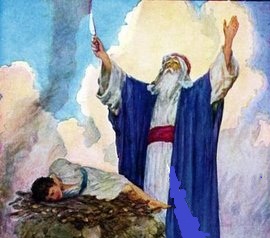 Hablamos del maqamul Iman (la estación de fe) donde están Sayyidina Ibrahim (as) y Sayyidina Ismail (as). Sayyidina Ibrahim (as) dio su propiedad. Y Sayyidina Ismail (as), quien es del linaje y de la luz de Sayyidina Muhammad ﷺ que es mucho más elevado, y dijo a su baba que “Tú me dabas. Yo estaba sacrificándome por Allah (AJ)”. Ahora es el zakah (la caridad) de haqiqah.
Hablamos del maqamul Iman (la estación de fe) donde están Sayyidina Ibrahim (as) y Sayyidina Ismail (as). Sayyidina Ibrahim (as) dio su propiedad. Y Sayyidina Ismail (as), quien es del linaje y de la luz de Sayyidina Muhammad ﷺ que es mucho más elevado, y dijo a su baba que “Tú me dabas. Yo estaba sacrificándome por Allah (AJ)”. Ahora es el zakah (la caridad) de haqiqah.
﴾فَلَمَّا بَلَغَ مَعَهُ السَّعْيَ قَالَ يَا بُنَيَّ إِنِّي أَرَىٰ فِي الْمَنَامِ أَنِّي أَذْبَحُكَ فَانظُرْ مَاذَا تَرَىٰ ۚ قَالَ يَا أَبَتِ افْعَلْ مَا تُؤْمَرُ ۖ سَتَجِدُنِي إِن شَاءَ اللَّـهُ مِنَ الصَّابِرِينَ ﴿١٠٢
37:102 – “Falamma balagha ma’ahus sa’ya qala ya bunayya inni ara fee almanami annee adhbahuka fanzhur ma dha tara, Qala ya abati if’al ma tu maru, satajidunee inshaAllahu minas Sabireen.” (Surat As-Saffat)
Y, cuando tuvo bastante edad como para ir con su padre, dijo: «¡Hijito! He soñado que te inmolaba. ¡Mira, pues, qué te parece!» Dijo: «¡Padre! ¡Haz lo que se te ordena! Encontrarás, si Allah quiere, que soy de los pacientes». (Los quienes poner los rangos 37:102)
Ma’rifah – diste un khidmat y servicio. Haqiqah (la realidad) – pones tu cabeza, vas a sacrificar todo y cada tipo de humillación, cada tipo de dificultad, cada tipo de prueba viene en tu camino. Y su única respuesta es no hablas, no hablas, no hablas. Tienes una boca. Ellos pueden abrir la boca y pelear con todo el mundo. Pero el orden de Profeta ﷺ es, sé humillada para mí, guarda silencio para mí, sacrifícate para mí. Entonces aprenden el océano de la humildad. Tomaron un camino en el que no deben responder. No les importa cuanto la gente se les burlan y les humillan. Su vida no era para responder.
Sayyidina Musa (as) aceptó la humillación por el amor de Sayyidina Muhammad ﷺ
Vimos con Sayyidina Musa (as), Kalimulah, quien habla con Allah (AJ) y es ridiculizado por Sayyidina Khidr (as). Vete, no vas a tener la paciencia, ¿cómo puedes tener la paciencia cuando no sabes nada?
﴾قَالَ إِنَّكَ لَن تَسْتَطِيعَ مَعِيَ صَبْرًا ﴿٦٧﴾ وَكَيْفَ تَصْبِرُ عَلَىٰ مَا لَمْ تُحِطْ بِهِ خُبْرًا ﴿٦٨
18:67-68 – “Qala innaka lan tastatee’a ma’iya sabra. (67) Wa kayfa tasbiru ‘ala ma lam tuhit bihi khubra. (68)” (Surat Al-Kahf)
(67) Dijo: «No podrás tener paciencia conmigo. (68)¿Y cómo vas a tenerla en aquello de que no tienes pleno conocimiento?» (La Cueva, 18:67-68)
 Él es de unos profetas grandes de Allah (AJ). Pero tomó el camino y esa realidad para estar en la presencia de Sayyidina Muhammad ﷺ. Quiero ir donde los dos ríos se juntan, Ya Rabbi. Quiero la realidad de la ilaha ilAllah Muhammadun RasulAllah ﷺ
Él es de unos profetas grandes de Allah (AJ). Pero tomó el camino y esa realidad para estar en la presencia de Sayyidina Muhammad ﷺ. Quiero ir donde los dos ríos se juntan, Ya Rabbi. Quiero la realidad de la ilaha ilAllah Muhammadun RasulAllah ﷺ
﴾وَإِذْ قَالَ مُوسَىٰ لِفَتَاهُ لَا أَبْرَحُ حَتَّىٰ أَبْلُغَ مَجْمَعَ الْبَحْرَيْنِ أَوْ أَمْضِيَ حُقُبًا ﴿٦٠
18:60 – “Wa idh qala Mosa lefatahu laa abrahu hatta ablugha majma’a albahrayni aw amdiya huquba.” (Surat Al-Kahf)
Y cuando Moisés dijo a su mozo: «No cejaré hasta que alcance la confluencia de las dos grandes masas de agua, aunque tenga que andar muchos años». (La Cueva, 18:60)
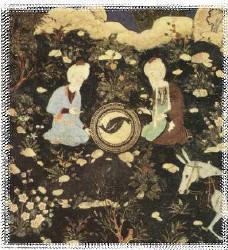 ¿Qué preguntó Allah (AJ) a él? Entonces encuéntrate con unos de mis creyentes que va a humillarte, y guarda silencio. Y es grande para Kalimulah, él el que habla con Allah (AJ), estar ridiculizado, ridiculizado hasta que a Sayyidina Khidr (as) le echó. ¿Piensas tu shaykh te echa? Sayyidina Khidr (as) echó a Sayyidina Musa (as). Esto es tú y yo, estamos acabados.
¿Qué preguntó Allah (AJ) a él? Entonces encuéntrate con unos de mis creyentes que va a humillarte, y guarda silencio. Y es grande para Kalimulah, él el que habla con Allah (AJ), estar ridiculizado, ridiculizado hasta que a Sayyidina Khidr (as) le echó. ¿Piensas tu shaykh te echa? Sayyidina Khidr (as) echó a Sayyidina Musa (as). Esto es tú y yo, estamos acabados.
﴾قَالَ هَـٰذَا فِرَاقُ بَيْنِي وَبَيْنِكَ ۚ سَأُنَبِّئُكَ بِتَأْوِيلِ مَا لَمْ تَسْتَطِع عَّلَيْهِ صَبْرًا ﴿٧٨
18:78 – “Qaala haazaa firaaqu bainee wa bainik; sa unabi ‘uka bitaaweeli maa lam tastati’ ‘alaihi sabraa” (Surat Al-Kahf)
Dijo: «Ha llegado el momento de separarnos. Voy a informarte del significado de aquello en que no has podido tener paciencia». (La Cueva, 18:78)
Y cuando Moisés dijo a su mozo: «No cejaré hasta que alcance la confluencia de las dos grandes masas de agua, aunque tenga que andar muchos años». (La Cueva, 18:60)
¿Comó podría alguien hablar con un profeta como así? Y toleró su humillación por el amor de Sayyidina Muhammad ﷺ.
Da de tu riqueza para lograr una posición celestial
Significa que el zakah (la caridad) es un océano siempre-expandiendo de la realidad. No es que di 2,5%, shaykh. Estamos bien, estoy bien con Allah (AJ). Allah (AJ) dice, “No, no”. Cuando mueran la primera cosa que van a preguntar a Allah (AJ) es “Déjame volver, vaciar mis cuentas” Porque uno, vas a preguntarme ¿para qué está en estas cuentas y cómo lo acumulé?
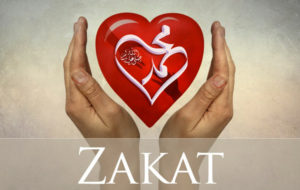 Y dos, podría haber alcanzado un darachat (el rango espiritual). Yo podría haber sido de los salihin (los justos) que entonces se convertiría shuhada (los testigos) y entonces ellos te llevarían a los sidiqin (los sinceros) y los sidiqin te llevarían a los nabiyin (los profetas) y entrar al corazón de Sayyidina Muhammad ﷺ.
Y dos, podría haber alcanzado un darachat (el rango espiritual). Yo podría haber sido de los salihin (los justos) que entonces se convertiría shuhada (los testigos) y entonces ellos te llevarían a los sidiqin (los sinceros) y los sidiqin te llevarían a los nabiyin (los profetas) y entrar al corazón de Sayyidina Muhammad ﷺ.
﴾وَمَن يُطِعِ اللّهَ وَالرَّسُولَ فَأُوْلَـئِكَ مَعَ الَّذِينَ أَنْعَمَ اللّهُ عَلَيْهِم مِّنَ النَّبِيِّينَ وَالصِّدِّيقِينَ وَالشُّهَدَاء وَالصَّالِحِينَ وَحَسُنَ أُولَـئِكَ رَفِيقًا ﴿٦٩
4:69 – “Wa man yuti’ Allaha war Rasula faolayeka ma’al ladheena an’ama Allahu ‘alayhim minan Nabiyeena, was Siddiqeena, wash Shuhadai, was Saliheena wa hasuna olayeka rafeeqan.” (Surat An-Nisa)
“Quienes obedecen a Allah y al Enviado, están con los profetas, los veraces, los testigos y los justos a los que Allah ha agraciado. ¡Qué buena compañía!” (Las mujeres, 4:69)
Subhana rabbika rabbal ‘izzati ‘amma yasifoon, wa salaamun ‘alal mursaleen, walhamdulillahi rabbil ‘aalameen. Bi hurmati Muhammad al-Mustafa wa bi siri Surat al-Fatiha.
Un agradecimiento especial a nuestros transcriptores por su colaboración en la transcripción de esta suhbah.
Fecha original de la suhbah: 19 de Marzo, 2020
Artículos Relacionados:
- Vow of Poverty Doesn’t Apply to Islam Go Make Money & Give Charity
- Keep Wudu at All Times to Avoid Sickness, Sins, Loss of Sustenance
- Do This to Protect You and Your Family From Coming Calamities!
- Dawah is a Spiritual Battle
- Fighting Desires and Build Internal Energy – Nafs Ammara
Por favor considere hacer una donación y apoyarnos en la propagación de estos conocimientos celestiales.
Copyright © 2021 Centro Islámico Naqshbandi de Vancouver. Todos los derechos reservados.













![Private: [ID: X1AFySox7yg] Youtube Automatic](https://nurmuhammad.com/wp-content/uploads/private-id-x1afysox7yg-youtube-a-236x133.jpg)
